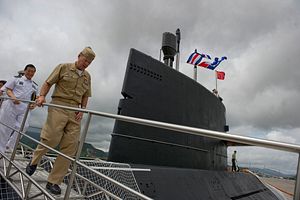Over the past few days, reports have surfaced that Thailand may now be getting serious about purchasing three submarines from China as part of a billion-dollar deal.
In July last year, Thailand’s defense minister Prawit Wongsuwan had said that Bangkok would be putting a hold on its newly announced submarine purchase from China, which had come as a surprise to many and had led to some domestic opposition (See: “Is China’s New Submarine Deal With Thailand Now In Peril?”). The move meant that the country’s dream of acquiring a capability it has lacked for more than six decades had once again been deferred.
But now reports have indicated that Thailand will be moving forward with the purchase. The latest round of media excitement stems from responses by defense minister Prawit Wongsuwan to journalist questions on Friday that the Royal Thai Navy (RTN) had already decided to buy submarines and that the first one would be purchased using the budget from fiscal year 2017. To some, that indicated a certain finality to the deal since the project had already been listed as a line item in the 2017 budget and the defense minister had approved of its inclusion.
“The Navy has already decided to buy submarines. Initially, it will use the budget of the 2017 fiscal year to buy the first one,” Prawit, who is also deputy prime minister, said according to The Nation.
In his responses to reporters, Prawit also defended the decision to go with Chinese submarines. He said that the RTN had already taken a close look at the various bids and determined that Chinese submarines were the best option. He added that the price for the submarines would not be that high since payment can be made in installments of up to ten years.
Prawit’s own support for the project is no surprise – as I’ve noted before, he has long been recognized as one of the most ardent supporters of Thailand acquiring a submarine capability. But to the extent that his comments could be read to constitute a confirmation of Thailand’s submarine purchase decision, they are only significant if they indicate a reworked plan that addresses the range of concerns that arose after the initial one.
For instance, deliberately choosing to make payments in ten year instalments – a longer period than initially was the case – would be one way of countering arguments that the purchase would be too expensive for Thailand. The Bangkok Post cited a RTN source as saying that given that it had met the defense ministry’s request that the payments for submarines be spread over eleven rather than seven years as earlier proposed, Prawit is now likely to support the project when it is submitted to the cabinet for approval. According to the source, the first submarine would be purchased at the cost of 13 billion baht between 2017-2021, and the second and third submarines would be purchased during the remainder of an eleven year period.
“Considering the indications from Gen Prawit and the prime minister, we are confident that they support the purchase plan and recognize the necessity to buy the submarines, though the plan may have to wait for the right time before it is brought before the cabinet,” the source reportedly said.
“The current government understands the importance of maritime security operations and, if the navy cannot buy the submarines during this government, there is no knowing whether it will be able to buy them when the next government comes to power,” the source added.
However, at the same time, Prawit did not elaborate about how other concerns may or may not have been addressed if indeed Thailand is seeking to go through with its earlier decision. Despite Prawit’s reassurances, suspicions about the reliability of submarines from Beijing are well known. Furthermore, as I have written elsewhere, the move could also potentially complicate Thailand’s alliance with the United States, especially since growing Chinese access to Thai military equipment and facilities may also mean proximity to U.S. technology as well as knowledge about Washington’s relationship with Bangkok (See: “Does Thailand’s Chinese Submarine Purchase Really Signal US Drift?”).
Many also continue to remain unconvinced about the need for Thailand to acquire a submarine capability in general due to various factors including the shallowness of the waters of the Gulf of Thailand as well as the lack of immediate and serious maritime threats. This is despite the RTN’s release of a nine-page white paper on the case for Chinese submarines last year which spelled out Thailand’s requirements as well as the desirable features of Beijing’s submarines, such as their double hull which makes them safer.
Addressing those concerns is important because, irrespective of Prawit’s views or the RTN’s decision to purchase the submarines, it will have to be approved at the cabinet level before going through. As of now, there is little clarity as to when this will occur and if it will be approved by Prime Minister Prayut Chan-o-cha.
In a hard-hitting editorial released July 5, The Bangkok Post urged Prayut to once again reject the defense ministry’s proposal, calling it a “terrible mistake.”
“The public never has favored the purchase of submarines and opposition has only grown,” the newspaper said. “It would be good for the public’s morale, and for his own image as leader, if Gen Prayut ended the suspense and called off this unnecessary purchase.”

































